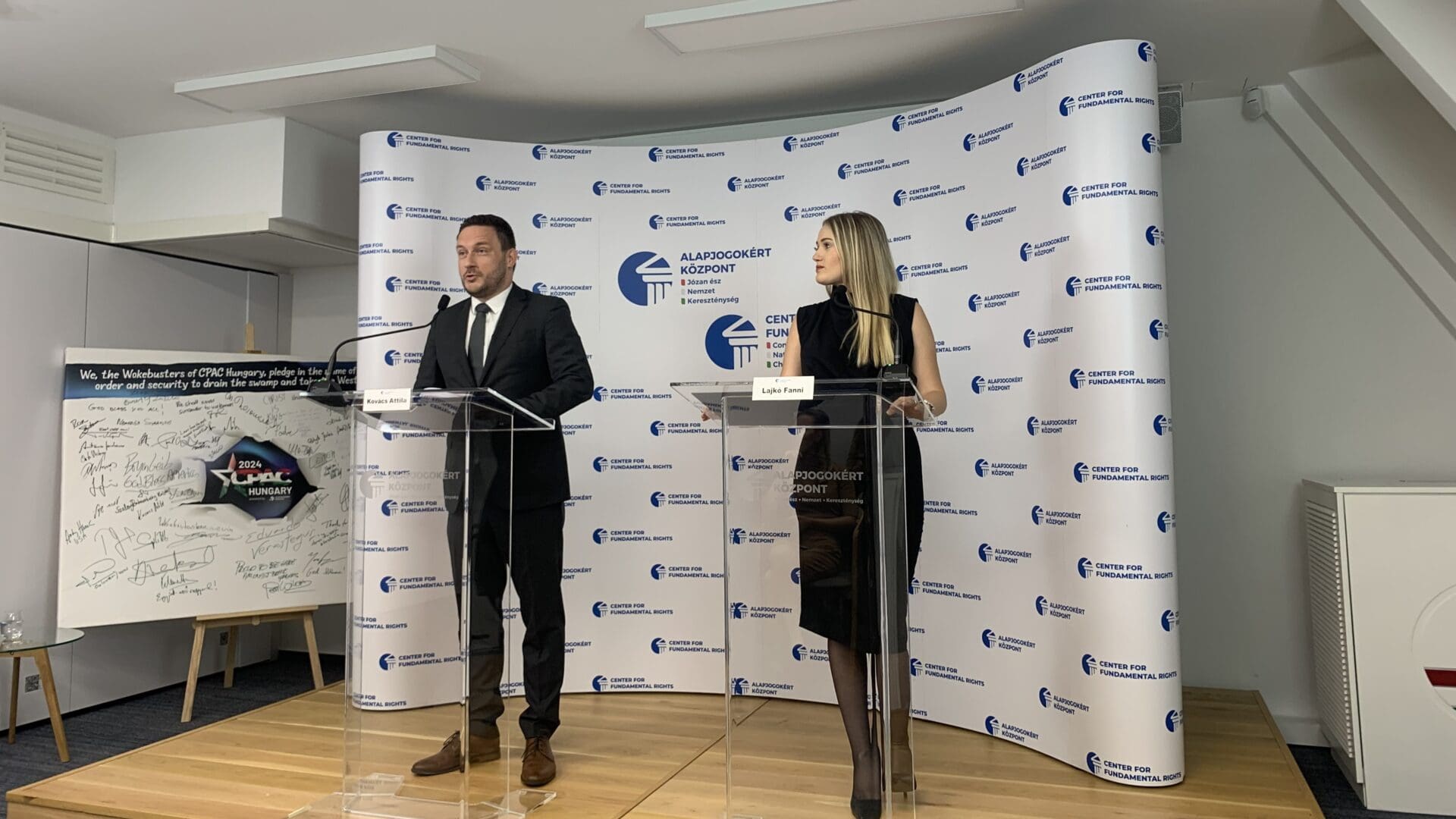At a press conference organized by the Center for Fundamental Rights on 13 June, Attila Kovács, EU Research Director for the Center for Fundamental Rights and analyst Fanni Lajkó highlighted several critical insights from the recent European elections. The results known four days after the EP elections were deemed substantial enough for a detailed analysis. According to the analysts, key tendencies have emerged, particularly the anticipated increase in influence of right-wing conservative parties, while European liberals and Greens experienced a decline. These two groups, notable for their support of migration and gender issues over the past five years, faced a substantial setback.
Behind the figures, there was a marked rise in the proportion of MEPs opposing the war, which increased from 23 per cent to 36 per cent. Similarly, those opposing gender-related proposals rose from 22 per cent to 34 per cent, and illegal immigration opposition surged from 27 per cent to 42 per cent. This suggests that even beyond the right-wing factions there are representatives who align with the Hungarian government on fundamental issues such as war, gender, and migration.
Kovács noted that the election results exceeded expectations, affecting dynamics within the European Parliament. In Germany, for example, the SPD appears to be in decline, with the AfD poised to gain prominence. In Romania, the RMDSZ secured a mandate, and the often anti-Hungarian AUR also performed well. Austria’s Freedom Party secured a confident win, positioning itself as a strong contender in the autumn parliamentary elections. The Netherlands witnessed a close contest between Wilders and Timmermans, and Greece is likely to undergo a government reformation favouring the right.
At the national level, changes are evident, according to the Center. Those Western European leaders who suffered significant defeats at home will find their manoeuvring space limited.
Many member states are on the brink of appointing new prime ministers, signalling a rightward shift in the European political landscape.
Von der Leyen may have celebrated the growth of the EPP, but it remains uncertain if she will continue leading the Commission. Macron’s influence may diminish as he focuses on domestic politics. The former Portuguese Prime Minister Costa, embroiled in a corruption scandal, is unlikely to serve as a positive example in the EP. EP President Metsola is expected to remain in her position, and the Estonian Prime Minister might also play a role.
The Hungarian governing party’s victory in the EP elections highlights the potential for national forces’ international cooperation, suggesting that Viktor Orbán’s policies could ultimately pay off. Leaders like Meloni, Le Pen, and even the AfD are becoming factors to reckon with in EU politics, reinforcing the strength of the European right both at the European and national levels.
Fanni Lajkó, analyst focusing on the EU at of the Center for Fundamental Rights, introduced the idea of a new era focused on peace, stability, and sovereignty. With more right-wing representatives in the European Parliament, these values, along with progressive European values, could come to the forefront.
It was also highlighted that
in Hungary voter turnout was above the EU average, reflecting the citizenry’s strong commitment to democracy.
While the EPP secured more mandates this time than five years ago, the S&D won 135, which is fewer than in the previous elections. At the same time, right-wing parties made significant gains, with the ECR winning 73 seats and the ID securing 58. In contrast, the left overall lost around 20 seats. This means that the combined right-wing factions could potentially hold 131 seats, a robust bloc that could reshape the EP’s character.
Key issues like migration, war, and gender ideology may see a rollback, signalling a victory for EU citizens who value peace, border protection, and sovereignty. The rise of the right is evident in countries like Belgium, where internal political crises have led to significant changes, and France, where the National Rally nearly doubled Macron’s coalition’s share. Hungary’s Fidesz party achieved almost 45 per cent, sending a clear message to Brussels about the Hungarian people’s desire to stay out of the war. Over 200,000 more votes went to the national side compared to five years ago, making it the most empowered governing party in the EU. All this represents an opportunity for the right-wing to form a coalition in the EP, prioritizing the protection, security, and sovereignty of member states.
In the coming weeks, all eyes will be on Meloni, who has indicated a desire to unite right-wing forces. She can count on Le Pen, who has actually come out of the European elections as the strongest leader on the right, and both Morawiecki and Orbán are open to coalition discussions. Meloni, on the other hand, might even collaborate with the EPP, though this would displease the social democrats and greens who oppose such alliances. In this new situation, Von der Leyen is caught between trying to satisfy both the ECR and the social democrat-greens, while the ECR and ID continue to seek greater influence in the Parliament.
The role of CPAC Hungary has also been crucial in bringing together right-wing EU parties, the Center analysts noted. Geert Wilders, for example, made significant strides, and the Estonian EKRE party, with 10,000 more votes, is also open to coalition talks. The Vox party in Spain doubled its mandates to six, and Slovenia’s Janša, who won four out of nine seats, is also a prime candidate to support the coalition. As Lajkó put it: ‘The EP elections caused a political earthquake in Europe.’
A right-wing coalition could become the second most powerful force after the EPP, potentially transforming the entire Union. It is time for the EU to recognize and accept this change, she concluded.
Related articles:







